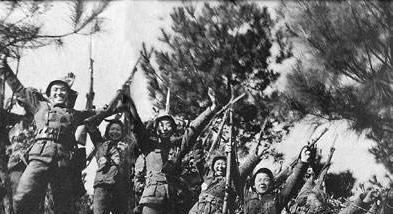The reason why China's War of Resistance Against Japanese Aggression was difficult was mainly because the gap in national strength was very obvious, after all, Japan was already a very advanced industrial country, and China was only a backward agricultural country, and Japan had been preparing for decades for the war of aggression, and the soldiers' training and equipment were very sophisticated, and the soldiers of the Chinese army were generally inferior to the Japanese army in terms of combat quality.

The Battle of Guinan was a relatively large-scale battle on the frontal battlefield between China and Japan, in which the Japanese army concentrated more than 100,000 troops, of which only in the Battle of Kunlun Pass, a division and a brigade of more than 60,000 people were concentrated, and the troops responsible for fighting at Kunlun Pass were the Japanese 21st Army, which included the Fifth Division and the Taiwan Mixed Brigade, a total of about 30,000 people.
Due to the mistakes in the strategic layout in the early stage, the Japanese army almost drove straight in and almost occupied Kunlun Pass, when Chiang Kai-shek personally approved the transfer of the most elite Fifth Army to recover Kunlun Pass occupied by the Japanese army, the Fifth Army was the first mechanized unit in the Kuomintang army, and the acting commander was Du Yuming.
It should be known that although the strength of the Japanese army is not as good as that of the Chinese army, there is a problem, that is, in the battlefield of the War of Resistance, the number of Chinese troops must be three times more than that of the Japanese army to have a chance of victory, but the terrain of Kunlun Pass is dangerous, coupled with the tight defense of the Japanese army, the Fifth Army is not superior in numbers, and it has begun to be in an unfavorable position of attack, so it fell into a state of stalemate at the beginning of the battle.
Under repeated scrambles, all the outer positions of Kunlun Pass were broken, and the Japanese army was driven to Kunlun Pass, but this was even more difficult to deal with, and the Fifth Army, under the command of commander Du Yuming, fought for three days and three nights without being able to break through, and was severely reprimanded by Chiang Kai-shek, who ordered that within three days, at all costs, kunlun pass be retaken, and the Japanese side, in order to rescue Kunlun Pass, also sent a number of troops including the 21st Brigade, a total of more than 15,000 people.
However, in the battle, a company of the 21st Brigade of the Japanese Army was secretly attacked by the Chinese army, suffering heavy casualties, killing the Japanese brigade commander Masao Nakamura, and several other Japanese reinforcements were also severely damaged, and it was difficult to advance in a short period of time, but the Japanese army still stubbornly resisted, especially the terrain of Kunlun Pass, coupled with the air threat of the Japanese army, Du Yuming had nothing to do about this, but under the premise of the unity of the officers and men of the unit, our army finally conquered Kunlun Pass, annihilated about 5,000 Japanese troops guarding the pass, and suffered 15,000 casualties.